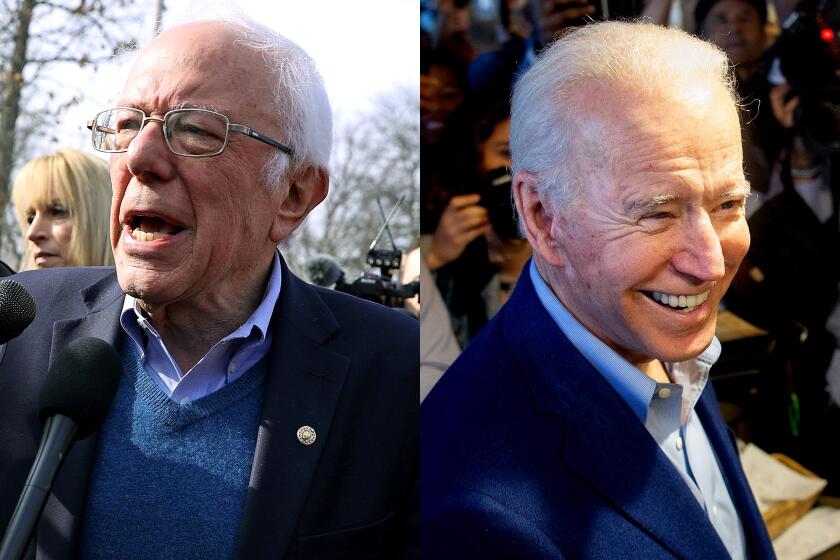Less than three weeks before Iowa begins the presidential balloting, six Democrats took to the stage for the first debate of the new year and the last before voters begin having their say.
The debate on the campus of Drake University featured four of the six candidates leading the presidential pack: former Vice President Joe Biden; former South Bend, Ind., Mayor Pete Buttigieg; and Sens. Bernie Sanders of Vermont and Elizabeth Warren of Massachusetts. The two others onstage, Minnesota Sen. Amy Klobuchar and billionaire political activist Tom Steyer, met the polling and fundraising requirements that shut out half a dozen other hopefuls.
The candidates, trying to make their case in a wide-open race, clashed on healthcare, war and a woman’s chances to win the presidency. Catch up on who said what in Des Moines:
- Share via
Bernie Sanders and Elizabeth Warren have tense exchange after the debate
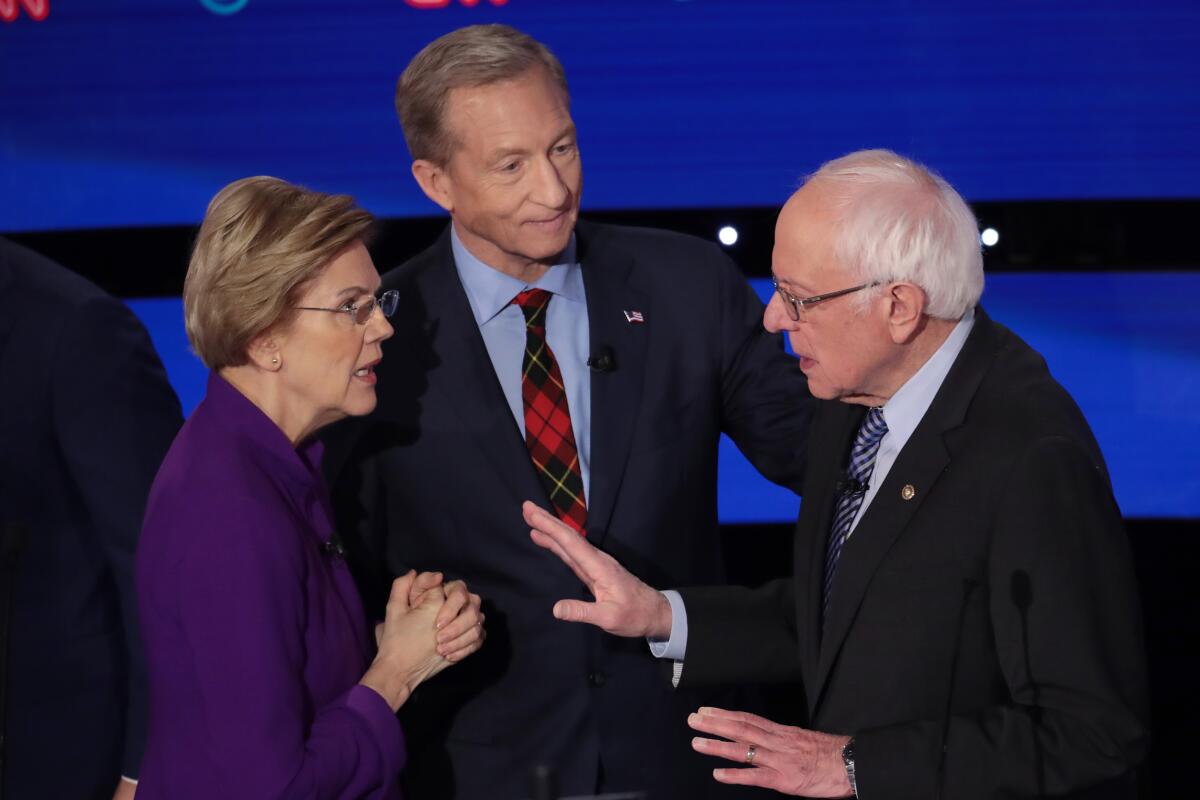
One of the most talked-about moments of Tuesday night’s Democratic debate happened after it ended, with a brief, terse exchange between Sens. Bernie Sanders and Elizabeth Warren after the handshake that wasn’t.
During the debate, moderators pressed both presidential candidates on reports that Sanders told Warren during a private 2018 meeting that a woman could not defeat President Trump. Sanders adamantly said that didn’t happen, while Warren stood by the account.
But when Sanders reached a hand out to Warren after the debate ended, presumably for a handshake, Warren pulled her hand back. The senators traded words — presidential candidate Tom Steyer awkwardly walked up mid-conversation — before they parted ways.
- Share via
Steyer and Klobuchar are challenged on their climate change records
San Francisco billionaire Tom Steyer, who has promised to declare climate change a state of emergency on his first day as president, was confronted in the Democratic debate Tuesday with his past investments in the fossil fuel industry.
Moderator Brianne Pfannenstiel of the Des Moines Register asked the former hedge-fund chief whether he was the right messenger in the fight against global warming in light of the money he made investing in coal, oil and gas.
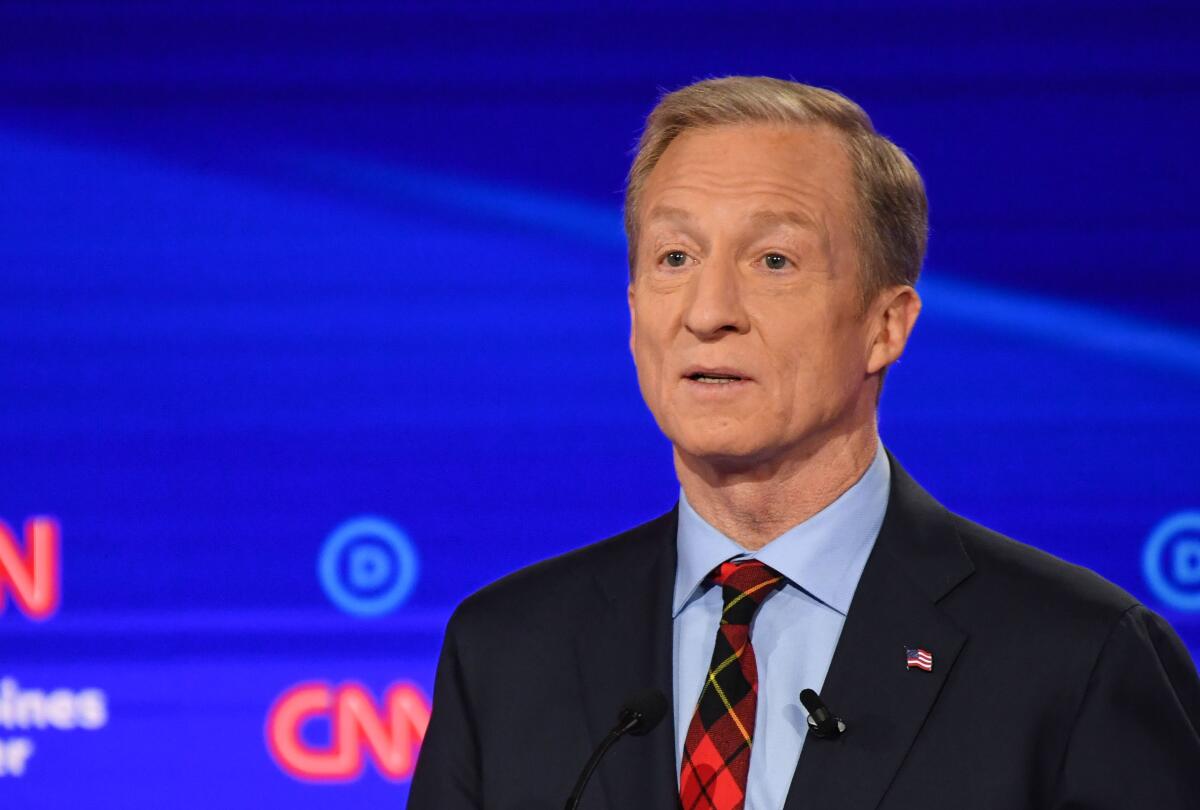
“I absolutely am,” Steyer said. “Look, we invested in every part of the economy, and over 10 years ago I realized that there was something going on that had to do with fossil fuels that we had to change, so I divested from fossil fuels.”
Steyer founded Farallon Capital Management, one of America’s largest hedge funds, and ran the firm for 26 years before leaving in 2012. Its fossil fuel investments included a giant Australia coal mine that generates vast quantities of carbon emissions.
Steyer mentioned his campaigning in recent years on a variety of climate change causes, including the fight against the Keystone pipeline. “For 12 years I’ve been fighting the climate crisis,” he said.
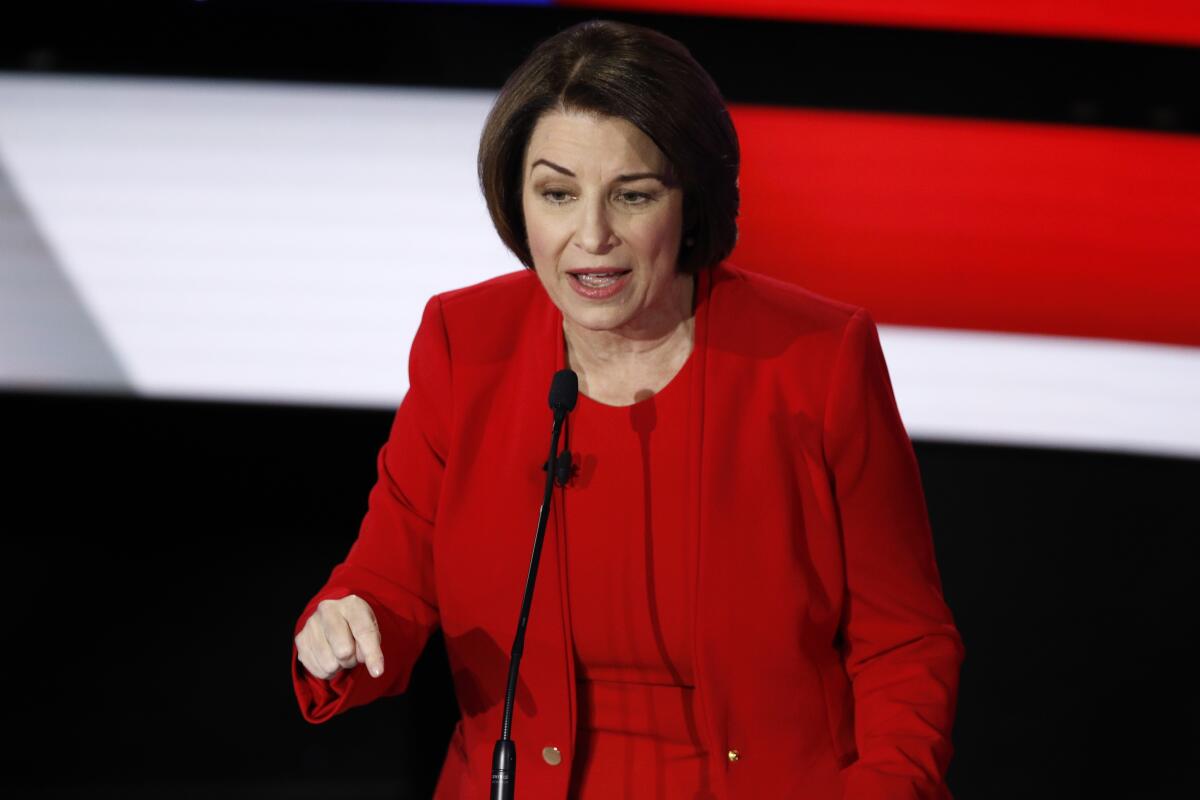
In a lengthy portion of the debate devoted to climate change, Minnesota Sen. Amy Klobuchar was asked about her support for fracking, the oil and gas extraction technique that involves the deep-earth fracturing of rock containing fossil fuels.
“When it comes to the issue of fracking, I actually see natural gas as a transition fuel,” she said as Vermont Sen. Bernie Sanders shook his head in disapproval. “It’s a transition fuel to where we get to carbon neutral. Nearly every one of us has a plan that is very similar, and that is to get to carbon neutral by 2045 to 2050, to get to, by 2030, to a 45% reduction.”
Sanders said the U.S. must lead the fight against climate change immediately.
“We have got to take on the fossil fuel industry and all of their lies,” he said, “and tell them that their short-term profits are not more important than the future of this planet.”
- Share via
Pete Buttigieg: ‘The black voters who know me best are supporting me’
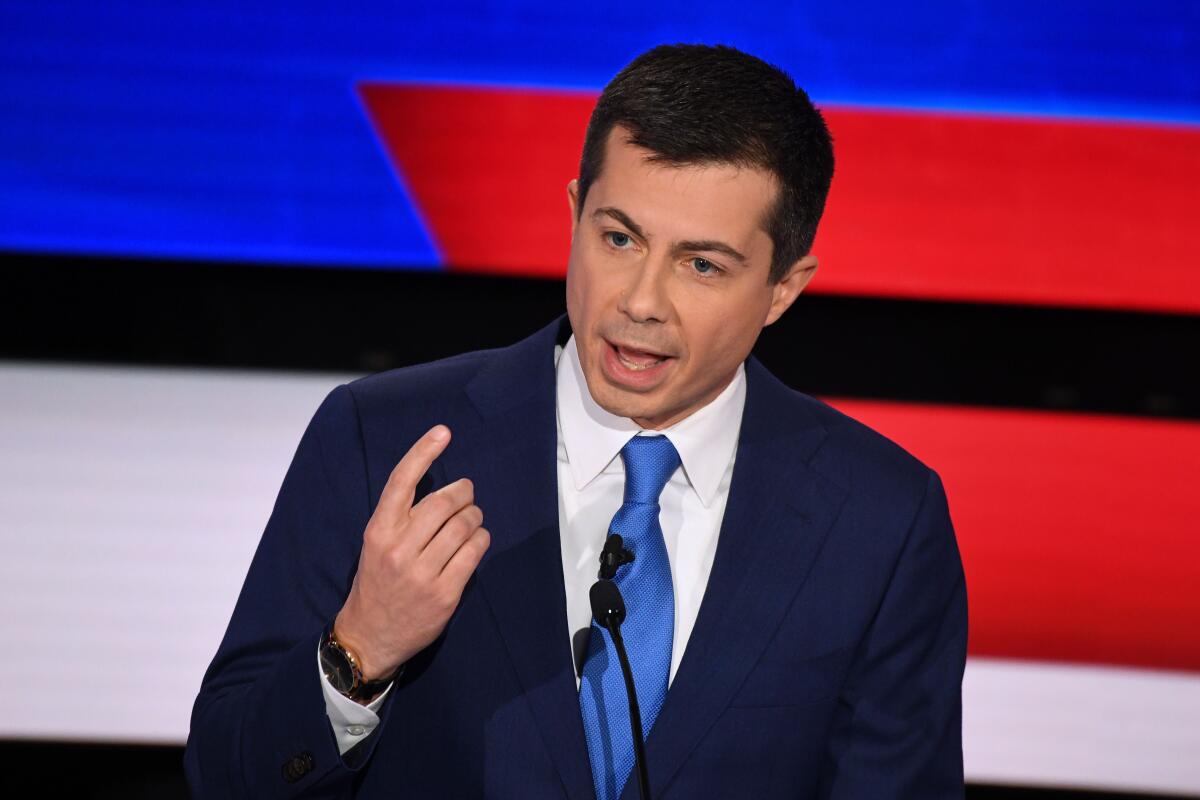
DES MOINES — A much-scrutinized phenomenon in the Democratic presidential campaign is former South Bend, Ind., Mayor Pete Buttigieg’s lack of support among expected primary voters who are black.
Asked by debate moderator and CNN reporter Abby Phillips about that lack of black support, Buttigieg responded, “The black voters who know me best are supporting me.” He cited supporters of his mayoralty in South Bend and “the work we have done facing some of the toughest issues that communities can [face].”
Buttigieg added: “The biggest mistake we could make is take black votes for granted, and I never will.”
But some of the black South Bend residents who know Buttigieg best are also among his harshest critics, including a small group of Black Lives Matter activists who have started traveling around the country to protest his candidacy over issues of policing and homelessness in South Bend.
You can read The Times’ reporting on Buttigieg’s record in South Bend here.
- Share via
Tom Steyer says he can beat President Trump on the economy
- Share via
Impeachment will tether candidates to Washington in final sprint before Iowa votes — how will they manage it?
The impeachment trial in Congress will throw a major wrinkle into the race, as the three senators on the debate stage will likely be tethered to Washington almost every day in the crucial two weeks before Iowans caucus on Feb. 3.
But there was unanimity on the issue when the moderators turned to it Tuesday night. Every one of the candidates firmly supports the proceedings, including Joe Biden, even as he is likely to be a topic of them.
The former vice president said any complications the proceedings create for the campaign are “irrelevant.”
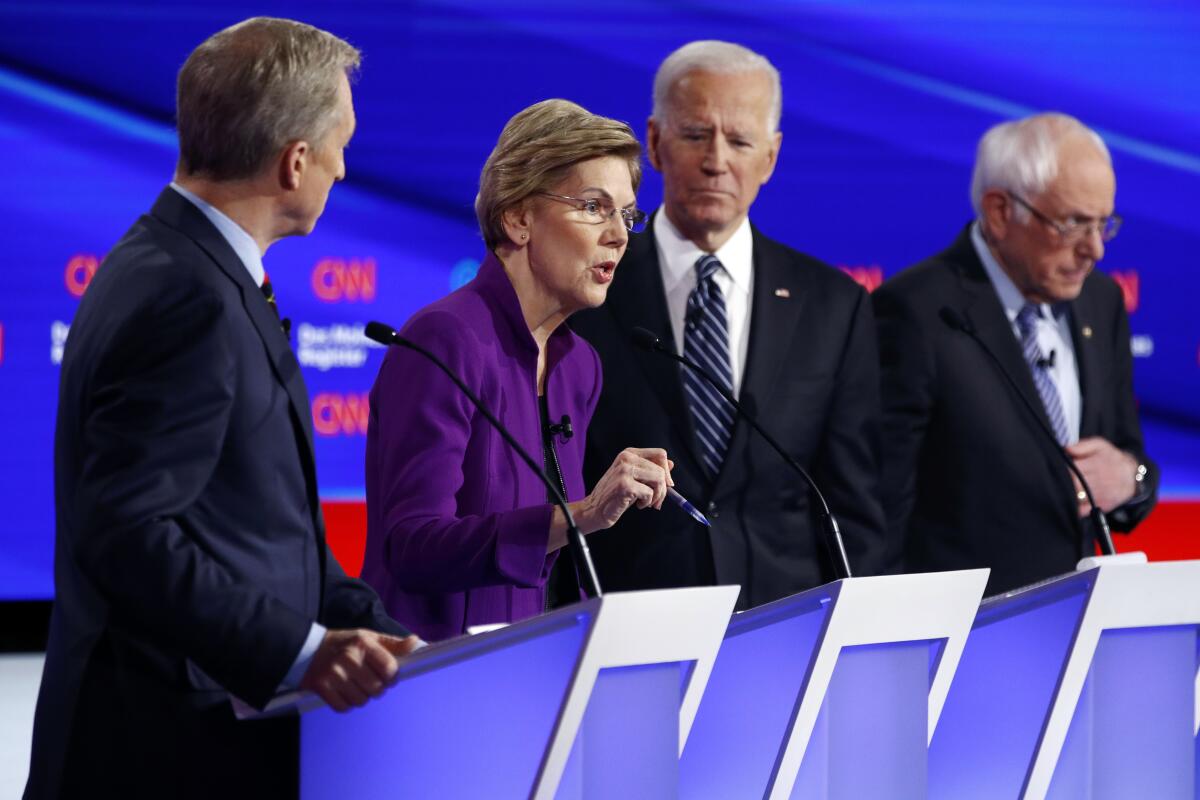
“There is no choice but for [Speaker] Nancy Pelosi and the House to move,” Biden said, pointing to the gravity of the allegations against President Trump.
“I understand how these guys are in this Republican Party,” Biden said. “They’ve gone after — savaged — my surviving son, have gone after me, told lies your networks and others won’t even carry on television because they’re flat-out lies. And I did my job. The question is whether or not he did his job, and he hasn’t done his job.… I can’t hold a grudge. I have to be able to not only fight but also heal.”
Minnesota Sen. Amy Klobuchar was asked whether she worried Trump would be emboldened by an acquittal. She said absolutely not, arguing that if Congress were to shy away from this trial it might as well crown Trump king. She called the hearings a “decency check” for the nation.
Massachusetts Sen. Elizabeth Warren said she can’t worry about the missed time on the campaign trail.
“Some things are more important than politics,” she said. She argued the trial would be an opportunity for lawmakers to show the “corruption of this administration. That is what lies at the heart of it.”
- Share via
Child care exchange turns philosophical: Is the social safety net only for poorer people, or for everyone?
DES MOINES — A round of debate questions about free and lower-cost child care and schooling was actually about one of the bigger philosophical splits in the Democratic field: Is the social safety net only for poorer people, or is it for everyone?
Debate moderator and Des Moines Register reporter Brianne Pfannenstiel, citing a question from an Iowa voter, grilled the candidates about their positions on creating more affordable child care.
Pete Buttigieg proposed pushing child care costs to only 7% of income, except for people in poverty. Warren pushed universal child care for everyone, with the wealthier paying a small fee.
If you’re in that top income bracket, don’t get me wrong, I wish you well … I just need you to go ahead and pay that tuition.
— Pete Buttigieg
Discussion quickly shifted to the linked subject of schooling and college, where the split over universal availability versus limiting benefits through means-testing — linking benefits to how much money someone makes — has been much more explicit, pitting the progressives against the moderates.
“If you’re in that top income bracket, don’t get me wrong, I wish you well. … I just need you to go ahead and pay that tuition,” said Buttigieg of fully free-college proposals like those of Bernie Sanders and Elizabeth Warren.
If a wealthy person “wants to send his kid to public university, I’m OK with that,” said Warren, who added that such benefits would be funded through a wealth tax that would land most heavily on wealthy taxpayers.
Pfannenstiel asked Tom Steyer, a billionaire who has also proposed a wealth tax, whether his children should have been able to attend college for free. “No,” Steyer said.
- Share via
Buttigieg and Warren sound off on climate change threats
- Share via
Candidates tear into one another over ‘Medicare for all’
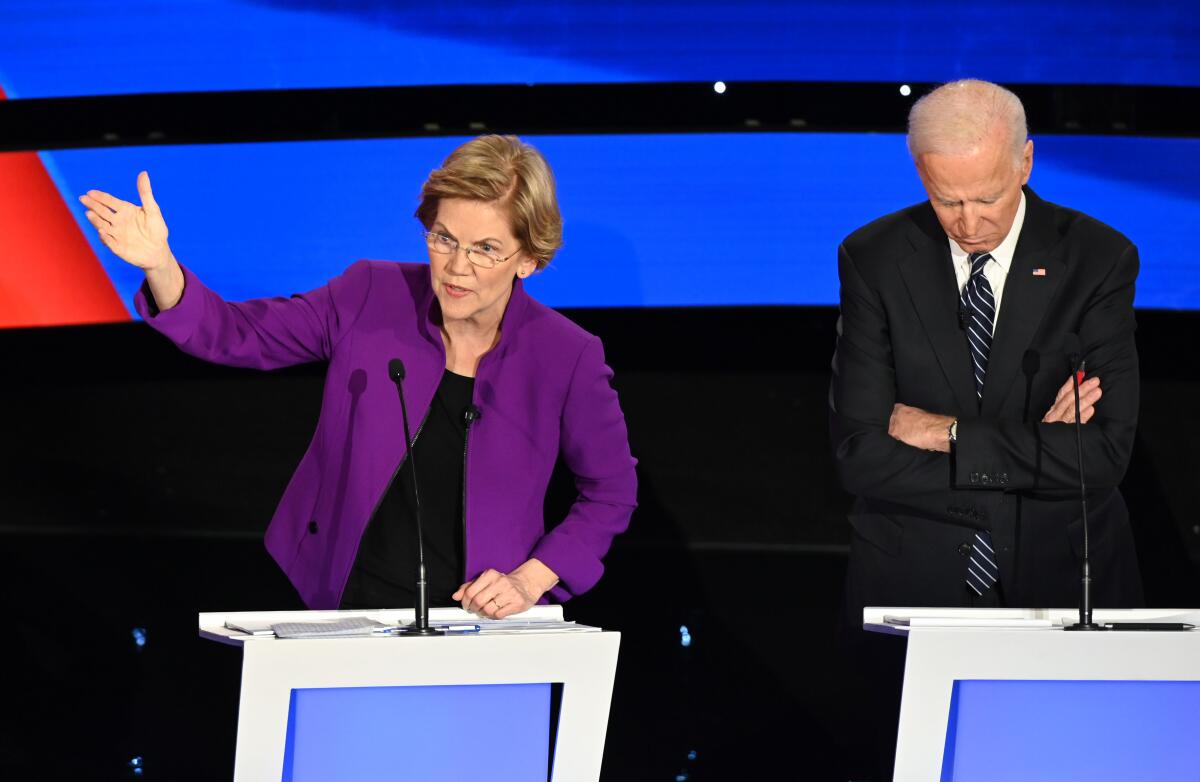
WASHINGTON — When the debate turned to healthcare, the candidates engaged in a now-familiar clash. Elizabeth Warren and Bernie Sanders unapologetically pushed their case for government-run “Medicare for all” as Joe Biden, Amy Klobuchar and Pete Buttigieg warned they were not being up front with voters about the huge price tag of such a program.
“We need to begin to tell [the public] what we’re going to do and what it’s going to cost,” Biden said, arguing that Sanders’ proposal to cover the cost of free healthcare for all, largely with a 4% income tax, is unrealistic. Such a tax, he said, “doesn’t even come close to paying for between $30 and $40 trillion over 10 years,” referring to the estimated cost of the Sanders plan.
Warren tried to make the case that every plan proposed by every candidate on the stage is an improvement over the Trump administration’s policy of dismantling Obamacare. But she aggressively attacked the moderates on the stage when they took aim at her proposal.
“The numbers the mayor is offering just don’t add up,” Warren said of Buttigieg’s argument that transformational change can happen in healthcare without spending the tens of trillions Sanders and Warren envision. She said the Buttigieg plan simply would not provide the needed relief to a low-income family struggling with medical bills that average $12,000 per year. “You can’t cover that with the kind of money the mayor is talking about,” Warren said.
Buttigieg took exception.
“It’s just not true that the plan I am proposing is small,” he said. He complained of a “Washington mentality” that he said judges the bigness of a plan by how many trillions it cost and the boldness is judged by “how many Americans you can alienate.”
Buttigieg found an ally in Klobuchar, who has tended to be one of his toughest critics on the debate stage. She joined him in attacking Warren.
“It is much better to build on the Affordable Care Act, and if you want to be practical and progressive at the same time, and have a plan and not a pipe dream, you have to show how you’re going to pay for it,” Klobuchar said.
- Share via
Michael Bloomberg’s face on a meatball? His social media staff has some fun during the debate
During the Democratic debate, a Twitter account linked to former New York Mayor Michael R. Bloomberg’s presidential campaign sent out odd messages, like what kind of podium Bloomberg would use if he makes the debate stage and another one that featured his face on meatballs.
The account, which is verified by Twitter and had more than 19,000 followers (and counting), started tweeting around the beginning of the debate, promising to share facts about the candidate.
He responded with seeming puzzlement.
“Should I be worried about this?” Bloomberg tweeted, from his own account.
- Share via
Biden vows no meeting with Kim Jong Un without conditions
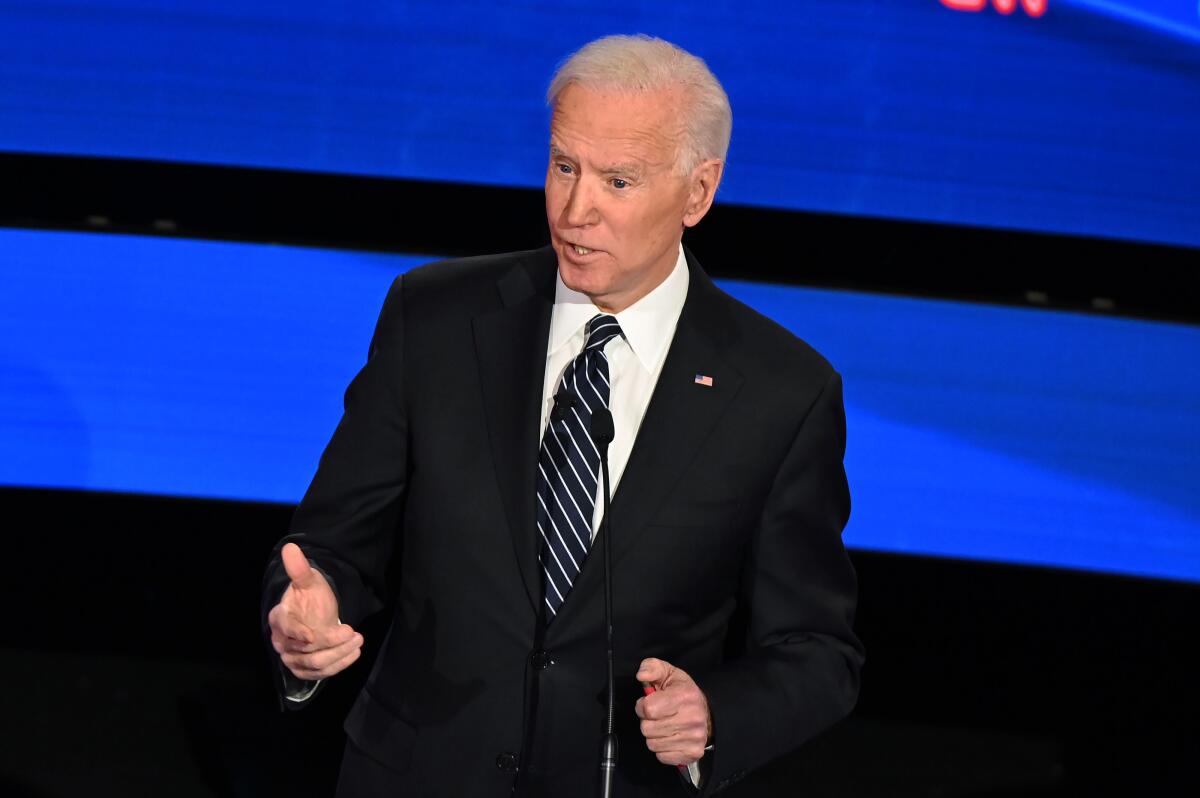
Former Vice President Joe Biden said in the Democratic presidential debate on Tuesday that he would refuse to meet with North Korean dictator Kim Jong Un in the absence of certain conditions beforehand related to the rogue nation’s nuclear weapons program.
Biden’s position was notably different from Barack Obama’s stand in a Democratic primary debate in 2007, when he said he’d be willing during his first year as president to meet with the leaders of North Korea, Iran, Syria, Venezuela and Cuba.
Absent preconditions. I would not meet with the, quote, supreme leader, who said Joe Biden is a rabid dog, he should be beaten to death with a stick.
— Joe Biden on North Korean leader Kim Jong Un
Obama’s Democratic rival Hillary Clinton turned Obama’s statement against him, saying it was “irresponsible and frankly naive.”
When asked Tuesday whether he’d meet with Kim, Biden criticized President Trump for his two summits with the North Korean leader. He said he would try to get China to pressure North Korea to pull back on its development of nuclear weapons.
“Absent preconditions, I would not meet with the, quote, supreme leader, who said ‘Joe Biden is a rabid dog, he should be beaten to death with a stick,’” Biden said.
Vermont Sen. Bernie Sanders interjected: “Other than that, you like him.”
As the audience burst into laughter, Biden said, “Other than that, I like him.”
- Share via
Candidates take aim as they push the conversation to climate change
Even before the debate moderators turned to climate change, the candidates were eager to steer the discussion in that direction.
Vermont Sen. Bernie Sanders brought it up as the candidates argued about national security, making the case that building an international coalition to fight climate change is as important to creating a safer, more prosperous world as coalition-building to create peace in the Middle East.
Sanders went on to defend his opposition to a major trade deal being negotiated by the Trump administration — and supported by some of his rivals on the stage — by noting it does little to confront global warming.
“Every major environmental organization has said no to this new trade agreement,” Sanders said of the so-called USMCA deal with Canada and Mexico, “because it does not even have the phrase ‘climate change’ in it. And given the fact that climate change is right now the greatest threat facing this planet, I will not vote for this trade agreement.”
Sanders scoffed when the moderator tried to steer the discussion back to trade, arguing that the issues can’t be separated.
Billionaire activist Tom Steyer then scolded candidates on the stage who have not made climate change their No. 1 priority, as he has. He took particular aim at former South Bend, Ind., Mayor Pete Buttigieg and his support of the trade deal.
“I’ve got four kids between the ages of 26 and 31,” Steyer said. “I cannot allow this country to go down the path of climate destruction. Everybody in their generation knows and, frankly, Mayor Buttigieg, you are their generation. I think you would be standing up more. … We cannot put climate on the back seat all the time.”
Buttigieg took exception.
“We’re going to tackle climate from Day 1” of a Buttigieg administration, he said. “It’s why we’ve got to make sure that we have better answers than we do today.
“Now what I’ve noticed is pretty much all of us propose that we move on from fossil fuels by the middle of the century.” He then asked whether any of the candidates are prepared to actually make sure it gets done, noting the same promises have been made for years, but the policies have stalled.
- Share via
Sanders sees debate constraints as he links climate change with other policy issues
DES MOINES — Sen. Bernie Sanders got rapped on the knuckles by a moderator again for trying to wrest a debate topic toward climate change, which he sees as linked with other policy issues that have often been historically perceived as separate topics.
During the last debate in Los Angeles in December, Sanders (undoubtedly to his chagrin) provoked one of the biggest applause lines from a debate when he responded to a question about race by saying, “I wanted to get back to the issue of climate change for a moment, because I do believe this is the existential issue.”
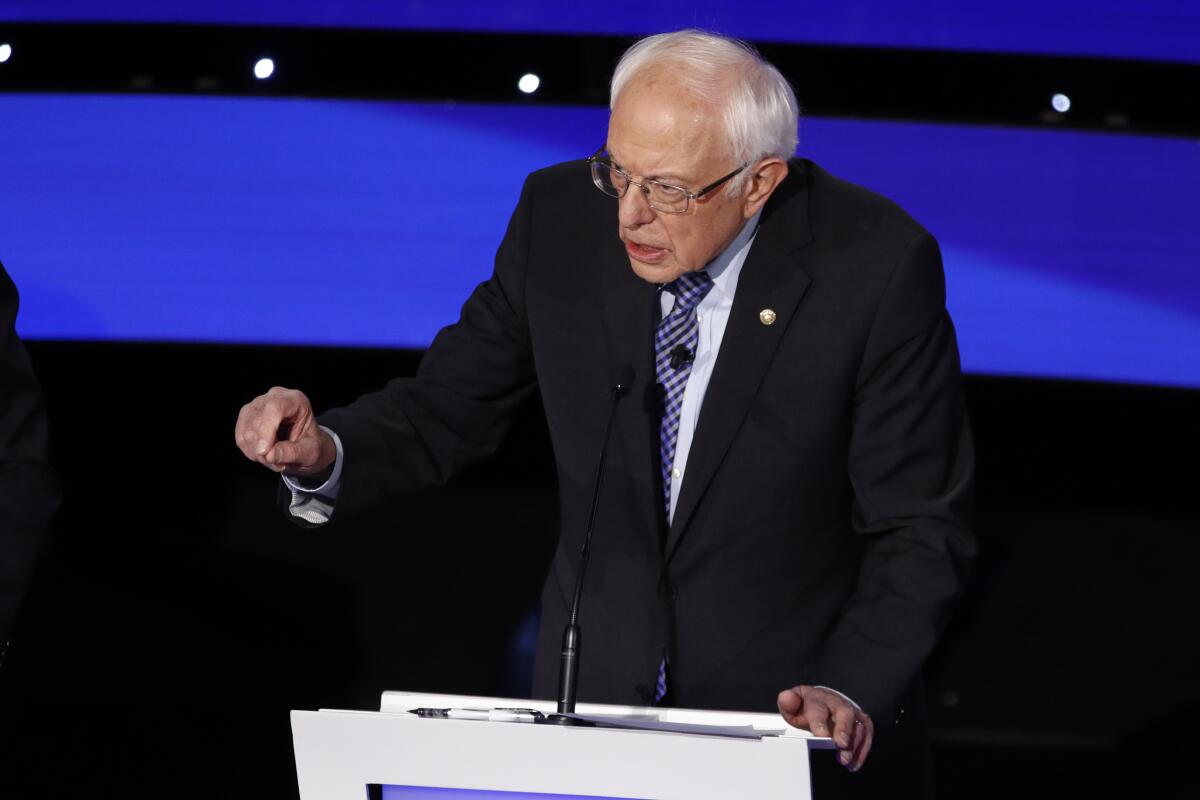
“Senator, with all respect, this question is about race. Can you answer the question as it was asked?” PBS moderator Amna Nawaz said, drawing a huge cheer from the crowd.
“I certainly can,” Sanders replied then. “Because people of color, in fact, are going to be the people suffering most if we do not deal with climate change.”
On Tuesday night in Des Moines, Sanders said he opposed the new USMCA trade agreement, partially because he thinks it won’t prevent outsourcing, but also because he thinks the agreement doesn’t do anything to address climate change, and “the planet that we’re going to be leaving our kids and our grandchildren will be increasingly unlivable.”
Debate moderator and Des Moines Register reporter Brianne Pfannenstiel told Sanders that she would get to climate change soon, but that she wanted to stay on the topic of trade.
“They are the same on this issue,” Sanders replied.
- Share via
Sanders denies telling Warren he did not believe a woman could win the presidency
Elizabeth Warren confronted Bernie Sanders face-to-face in Tuesday’s debate over her allegation that he told her privately that a woman could not be elected president.
“Can a woman beat Donald Trump?” Warren asked after Sanders denied saying a woman could not win the presidency. “Look at the men on this stage. Collectively they have lost 10 elections. The only people on this stage who have won every single election that they’ve been in are the women: Amy and me.”
The crowd at Drake University in Des Moines burst into cheers.

“So true,” Sen. Amy Klobuchar said as Sanders, Joe Biden, Pete Buttigieg and Tom Steyer looked on.
“And the only person on this stage who has beaten an incumbent Republican any time in the past 30 years is me,” Warren continued.
The real danger for the party, she added, is “picking a candidate who can’t pull our party together or someone who takes for granted big parts of the Democratic constituency.
Sanders, who ousted a Republican congressman in 1990, objected to Warren’s statement about the men’s loss record. Warren reminded him that she limited her statement to the last three decades.
Sanders also adamantly denied making the remark about women not being able to win the presidency in a private conversation with Warren at her Washington apartment in December 2018.
“Anybody who knows me knows that it’s incomprehensible that I would think a woman could not be president of the United States,” he said.
From the start of the 2020 campaign, Sanders has faced trouble with gender issues. He apologized a year ago for sexism, sexual harassment and pay discrimination by male supervisors in his 2016 campaign against Hillary Clinton.
But he faced instant criticism when he responded to a CNN question on why he’d been unaware of the accusers’ complaints by saying, “I was a little bit busy running around the country trying to make the case.”
He was more forceful in a subsequent apology, saying the discrimination against women who worked on his 2016 campaign was “absolutely unacceptable.”
- Share via
Candidates accuse Trump of lying about killing of Iranian general
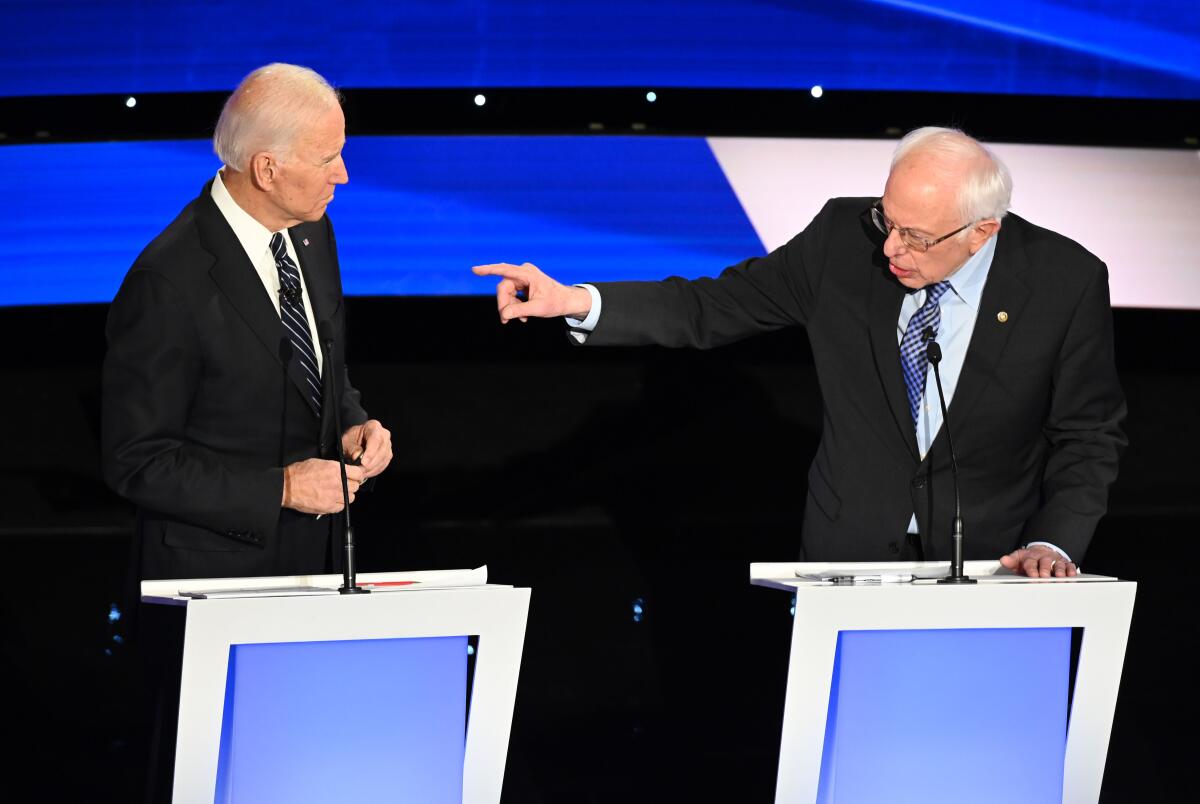
WASHINGTON — Joe Biden and Bernie Sanders have sparred over their record on the Iraq war, but they’re in agreement on how President Trump has handled Iran. Both accuse him of lying about his reasoning for killing Gen. Qassem Suleimani, one of Iran’s most powerful leaders.
Trump and administration officials have struggled to keep their stories straight about that drone strike in Iraq, at first claiming that it was necessary to prevent an “imminent” threat against Americans, but later saying it was retaliation for earlier attacks.
Questions over killing Suleimani quickly led to a broader conversation, one that’s also taking place on Capitol Hill, about the president’s ability to take unilateral military action. Unless an imminent threat required a quick response, the Democratic candidates pledged to seek congressional approval.
That’s something presidents have been reluctant to do — often with the tacit approval of lawmakers, who don’t want the political blowback of supporting potentially unpopular military operations.
Pete Buttigieg went a step further by saying not only would he seek congressional approval, but that approval would include a sunset clause requiring reauthorization after three years.
The U.S. military presence in the Middle East was not popular among the candidates, although Biden and Sen. Amy Klobuchar said they would leave a small number of troops there.
Sen. Elizabeth Warren was more emphatic about pulling out combat troops.
“We should stop asking our military to solve problems that cannot be solved militarily,” she said.
- Share via
Commander in chief question opens Sanders attack on Biden over Iraq war
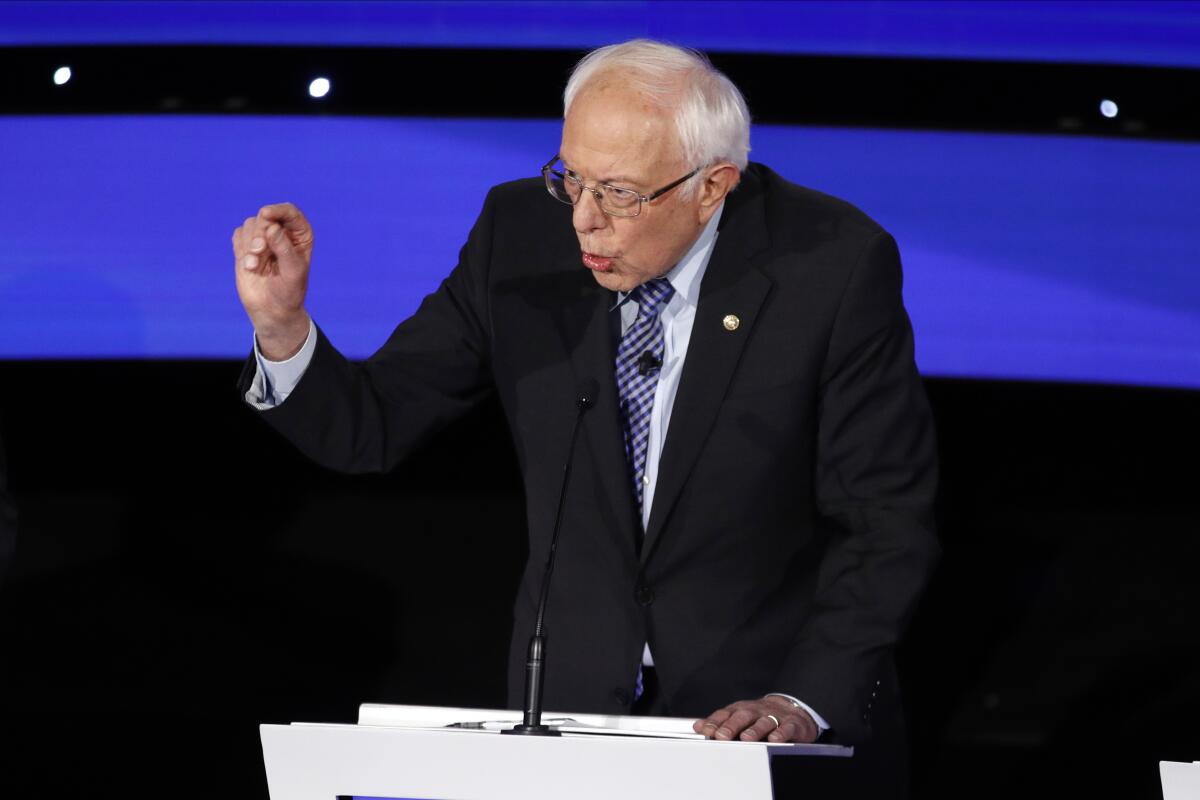
WASHINGTON — With the Iran crisis refocusing attention on the Middle East, the Democratic debate started off with a question about foreign policy. Not surprisingly, the Iraq war remains a fault line between Sen. Bernie Sanders and former Vice President Joe Biden.
Sanders said he was best qualified to be commander in chief because he voted against the war in 2003. “I am able to bring people together to try to create a world where we solve conflicts over the negotiating table,” he said.
Biden said his vote for the war was a mistake and shifted his focus to his service under President Obama, where he worked toward winding down the U.S. deployment in Iraq.
Obama, who had voted against the invasion, “turned to me and asked me to end that war,” Biden said.
Sanders wasn’t impressed. He recalled the push for war from George W. Bush and other members of his administration.
“I thought they were lying,” he said. “Joe saw it differently.”
Biden’s late son, Beau, was a captain in the Delaware Army National Guard and spent a year in Iraq.
- Share via
Biden touts experience as Democratic debate starts with a question about foreign policy
- Share via
And they’re off. The first Democratic debate of the new year has started
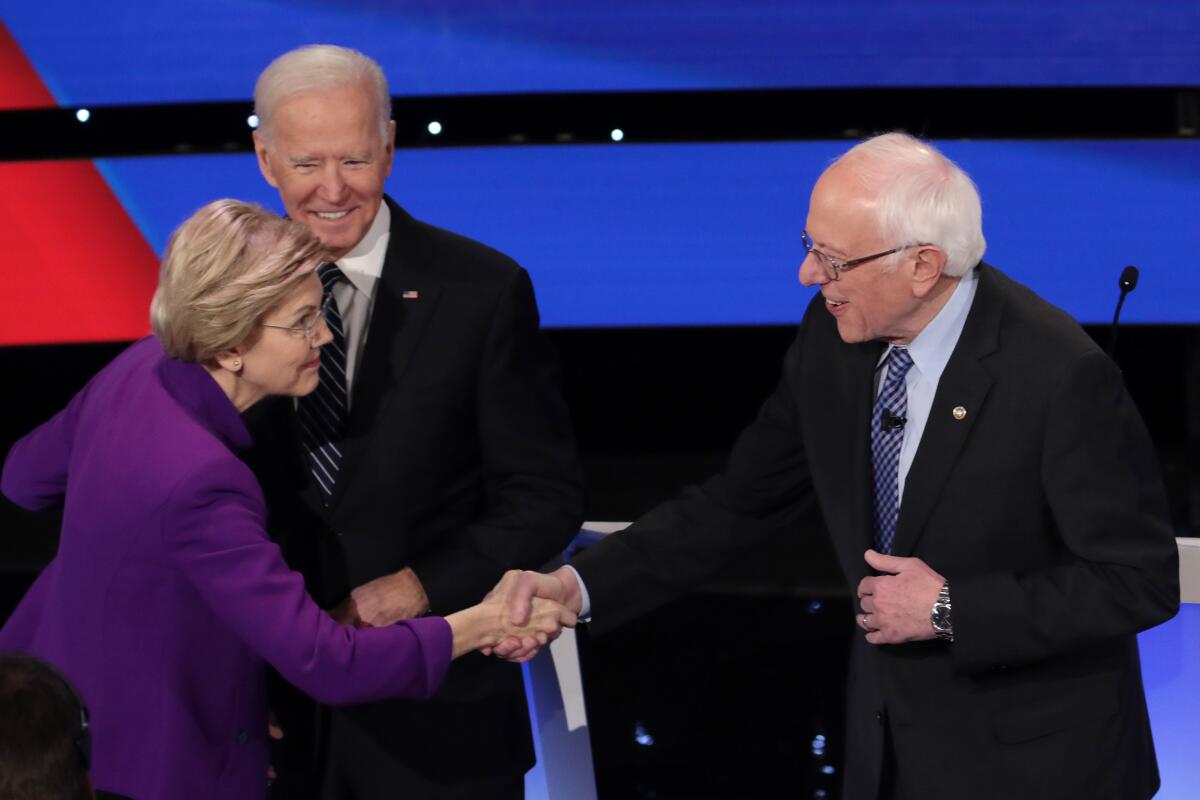
DES MOINES — The six debate participants have taken the stage: Sens. Amy Klobuchar, Bernie Sanders and Elizabeth Warren; former Vice President Joe Biden; former South Bend, Ind., Mayor Pete Buttigieg; and billionaire activist Tom Steyer.
Many eyes will be on Warren and Sanders tonight and whether they will bury the hatchet on their campaigns’ recent feuding. The pair of progressives greeted each other with a handshake.
— Matt Pearce
- Share via
Signs of a pre-debate deescalation between Sanders and Warren?
A top advisor to Bernie Sanders said he expects that the Vermont senator and his Democratic rival Sen. Elizabeth Warren of Massachusetts will largely set aside their campaigns’ recent squabbling for Tuesday night’s debate in Des Moines.
“From what I’ve heard from their campaign, and certainly from our campaign, I think we’re all mostly done talking about it, frankly,” Weaver said on MSNBC.
Tensions between the two progressive presidential hopefuls, who largely have avoided criticizing each other, have been rising since reports circulated that Sanders organizers were planning to attack Warren in their conversations with Democratic voters.
Matters escalated further with initially anonymously sourced reports Monday that Sanders had told Warren during a private 2018 meeting that he thought a woman couldn’t win the presidency.
Sanders vehemently denied the report and accused Warren’s staffers of lying.
Warren put out a statement saying that while Sanders had made the remark, she did not wish to discuss the matter further. “Bernie and I have far more in common than our differences on punditry,” she said.
Now Sanders’ camp appears to have accepted the olive branch.
“What they said was not correct, and what we said is correct, but I think based on what I know from their campaign, that’s where folks want to leave it,” Weaver said Tuesday.
- Share via
Andrew Yang isn’t at the debate, but he’s in Iowa, and he’s got PowerPoint
AMES, Iowa — Andrew Yang didn’t make the cut to appear on the debate stage, so the Democratic presidential candidate employed another method Tuesday that he said would help explain to voters his fears about automation’s impact on the American economy.
“I’ve been told over and over again, when you’re on the debate stage people don’t see the actual substance of the argument because you’re kind of compressed in a 60-second time crunch,” Yang told a few hundred people in an art gallery, standing in front of a PowerPoint presentation projected on a wall. “You’re all here for Andrew Yang’s version of a Netflix special.”
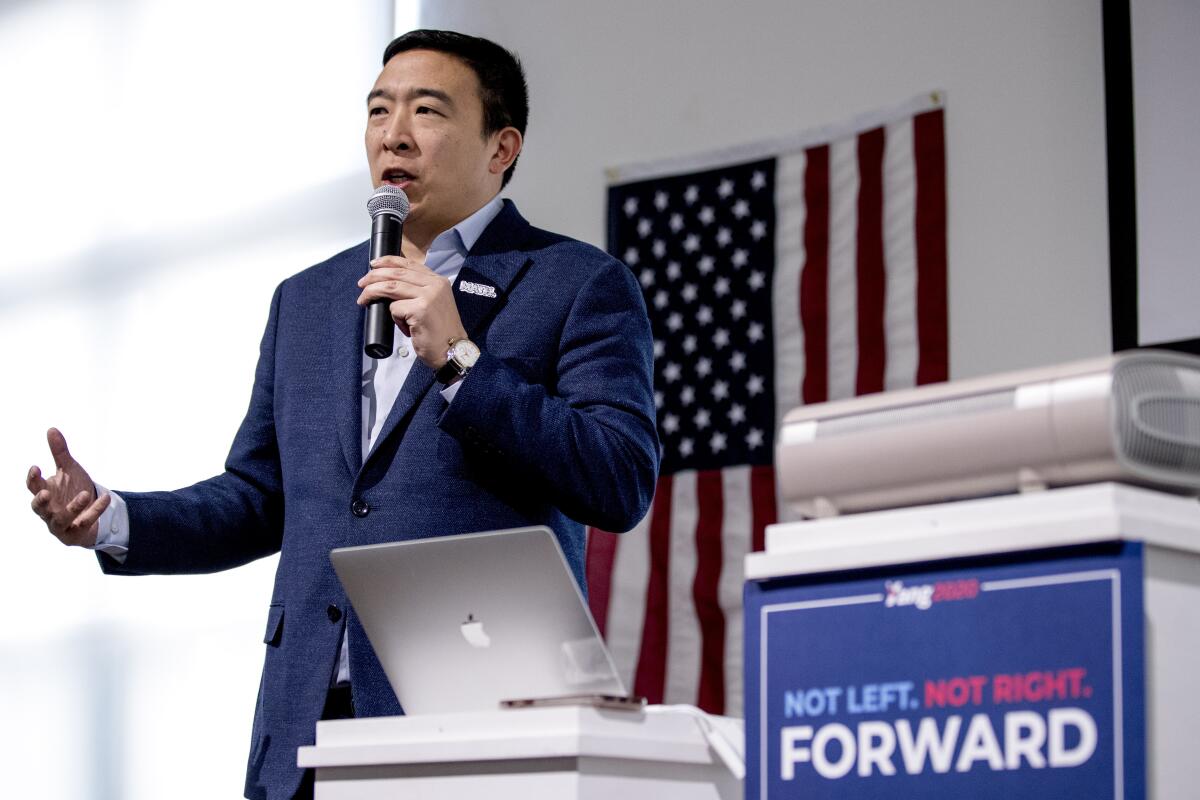
He rolled through job-loss statistics that he argued led to the election of President Trump, and warned of automation causing the loss of 2.5 million jobs annually in retail, driving and other job sectors.
“The reason Donald Trump is president today is because we automated away 4 million manufacturing jobs in the last few years. And where were those jobs? Ohio, Michigan, Pennsylvania, Wisconsin, Missouri and 40,000 right here in Iowa,” Yang said. “I have been to a town that lost their manufacturing jobs here in Iowa. After the plant closed, the shopping center closed, and then people left and then the school shrank. The town has never recovered.”
Yang touted his universal basic income of $1,000 per month for every adult American citizen as the solution.
It was a message that resonated with Lisa Kuehl, 60. The retired airline pilot had been planning on caucusing for former South Bend, Ind., Mayor Pete Buttigieg. But after seeing Yang speak in Ames, she was leaning toward supporting him instead.
“I really liked what I heard,” she said. “I liked the slideshow, the facts, the data. You can talk all you want about these issues, but sometimes the presentation format needs to be different for it to resonate. And I saw that, especially the explanation of why Donald Trump won so many of the industrial states.”
Kuehl was worried that Yang’s absence from the debate stage could harm his prospects.
“I think at this point if you’re not out there, people might forget about you,” she said. “It’s like in the laws of learning: The last thing you hear is what you remember.”
- Share via
Facing criticism over all-white debate, DNC chief defends qualification criteria
DES MOINES — Democratic National Committee Chairman Tom Perez on Tuesday defended the debate qualification criteria that resulted in an all-white stage for this evening’s candidate face-off.
“From the outset, we anticipated that we were going to have a historically large field. We [initially] set a low bar and were very transparent in our requirements,” Perez said. “At the same time, we were very clear that every month, we would raise the bar slowly and gradually and fairly.”
The DNC has faced criticism from New Jersey Sen. Cory Booker, former Massachusetts Gov. Deval Patrick and entrepreneur Andrew Yang over the rules for qualifying for the January debate. To make the stage, candidates needed to register at least 5% in four national or early-state polls or 7% in two early-state polls, and have at least 225,000 individual donors.
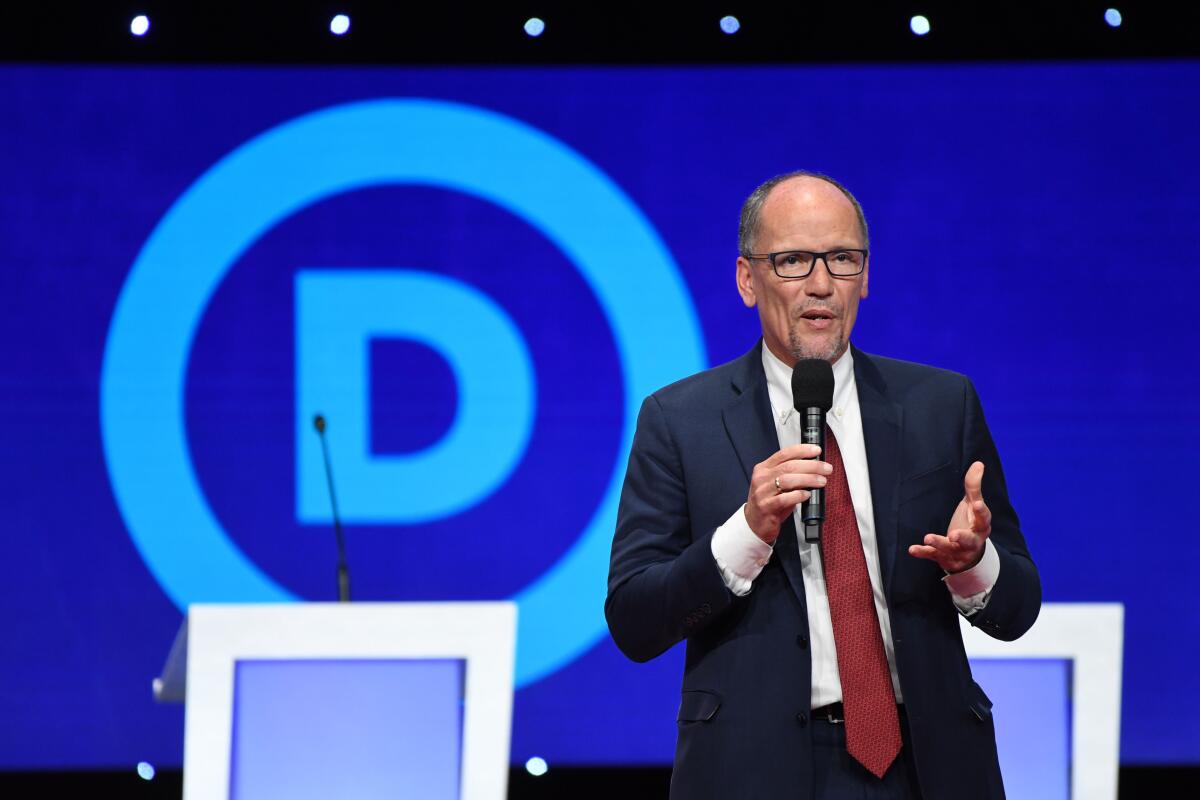
Six candidates — former Vice President Joe Biden; Sens. Elizabeth Warren of Massachusetts, Bernie Sanders of Vermont and Minnesota’s Amy Klobuchar; former South Bend, Ind., Mayor Pete Buttigieg; and billionaire Tom Steyer — made the cut.
Booker had led an effort urging the DNC to lower the debate requirements before dropping out of the race on Monday.
Perez noted that California Sen. Kamala Harris, who dropped out last year, would have qualified for the debate and said seeking this level of polling support is appropriate with less than three weeks to go before the Iowa caucuses.
“To give you a historic perspective, at this point in the primary phase, Barack Obama was in the low 20th percentile. Rev. [Al] Sharpton would have easily made it under this threshold, Jesse Jackson was in the high teens, low 20s,” he said. “ I bring that up because the candidates who poll at the top in the Democratic primary are the candidates who are most effectively connecting with the broad quilt of the Democratic Party.”
Perez said that he respected Booker, “but at the same time, I can’t make a separate set of rules for people that I like. And there are many people that are incredibly qualified that didn’t make the debate stage. … You have to demonstrate traction.”
- Share via
Tight polls, impeachment, billionaire wild cards: Uncertainty reigns in the 2020 Democratic race
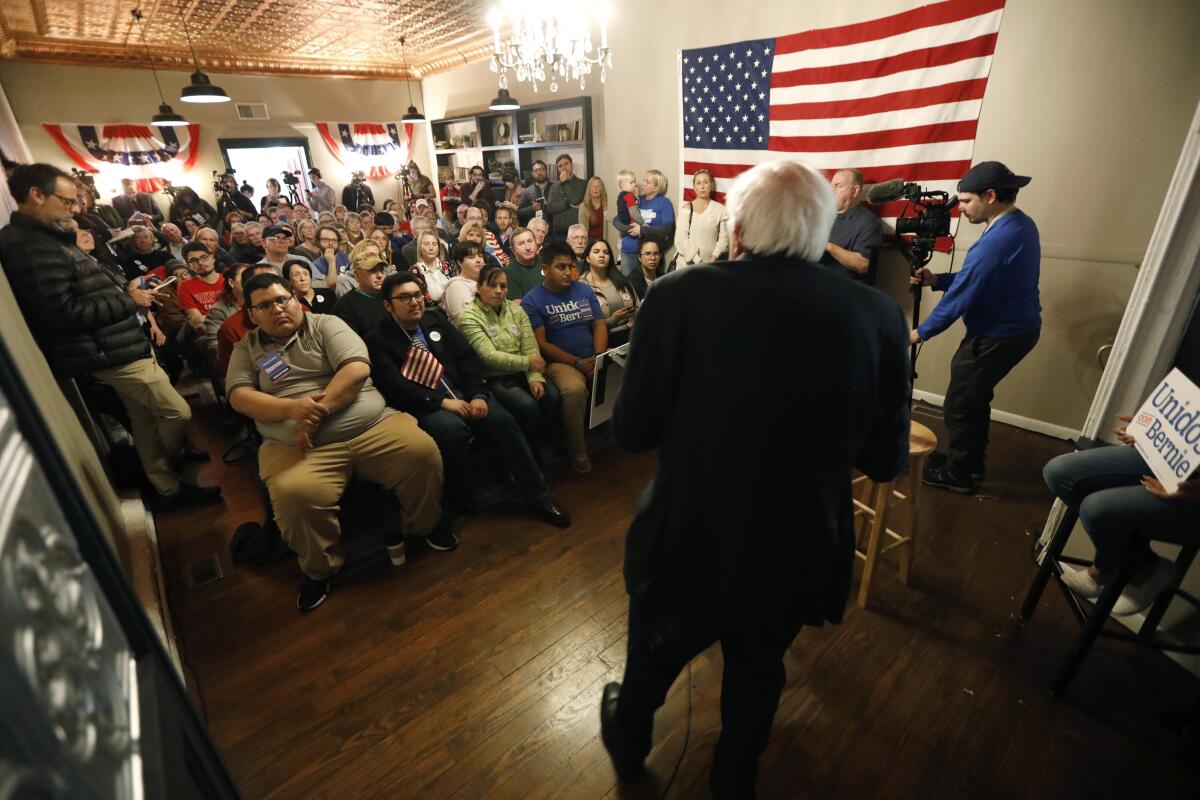
WASHINGTON — As Democrats’ top presidential candidates prepare to meet for the last debate before voters start weighing in, the primary contest remains one of the most unpredictable in decades — a contest not likely to end anytime soon.
In the absence of a commanding front-runner, and with a plethora of well-funded candidates in the top tier, party activists say they have less certainty about the outcome than at any time since 1992, when Bill Clinton ultimately won in a crowded field.
“I can’t remember a time when I had this many questions before the first votes,” said Rebecca Katz, a Democratic strategist who worked on John Edwards’ 2004 presidential campaign. “Things could play out 100 different ways.”
- Share via
What time is the January Democratic debate, and what’s at stake for candidates onstage?
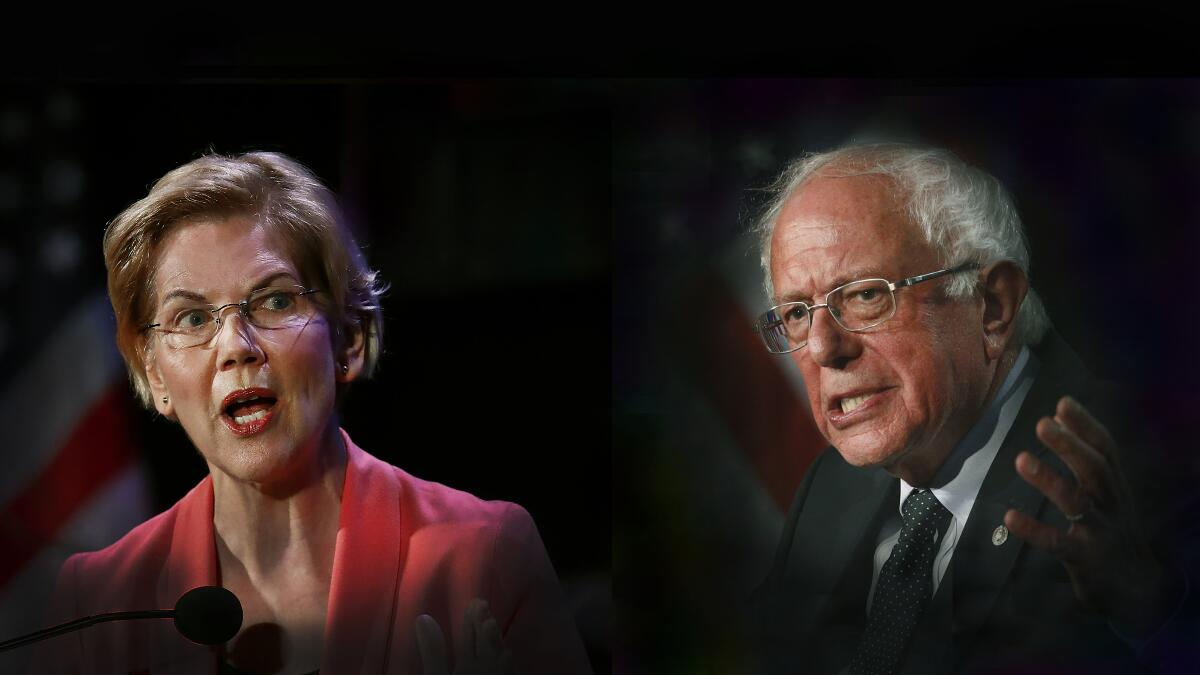
The Democratic presidential field is set to have its smallest and potentially most influential debate yet. It could also become among the most contentious if candidates bring their campaigns’ offstage issues onstage.
On Tuesday at 6 p.m. PST, six candidates are slated to gather at Drake University in Des Moines to slug it out less than three weeks before the first-in-the-nation caucuses in Iowa.
Gone are the two-night, 10-candidates-at-a-time spectacles that marked the earliest debate rounds of the Democratic contest last year. This two-hour debate will feature former Vice President Joe Biden; former Mayor Pete Buttigieg of South Bend, Ind.; Sens. Amy Klobuchar of Minnesota, Bernie Sanders of Vermont and Elizabeth Warren of Massachusetts; and billionaire activist Tom Steyer.
With fewer candidates onstage, there will be more time for each to spar, and this week Sanders and Warren were already clashing well before the debate. Warren blasted Sanders for sending volunteers out to “trash” her after his campaign reportedly circulated talking points aimed at Warren supporters, alleging she does not bring new voters into the process. And Sanders, accused of telling Warren in a 2018 closed-door meeting that a woman couldn’t win the presidency, responded to the anonymously sourced report by saying Warren’s staffers were lying. Then Warren issued her own statement, contradicting Sanders.
This will be the first debate round in which all the participants are white. A dozen Democrats are still campaigning, and notable names missing from the stage include Rep. Tulsi Gabbard of Hawaii, entrepreneur Andrew Yang and billionaire former New York Mayor Michael R. Bloomberg. Sen. Cory Booker of New Jersey dropped out of the contest on Monday.
- Share via
Who are the Democratic candidates for president?
Twelve major candidates are competing to become the Democratic Party’s nominee for president now that New Jersey Sen. Cory Booker has dropped out. With the start of the nominating process less than a month away, here are the nine men and three women aiming to face President Trump in 2020.
- Share via
Cory Booker quits presidential race, leaving an even more white Democratic field
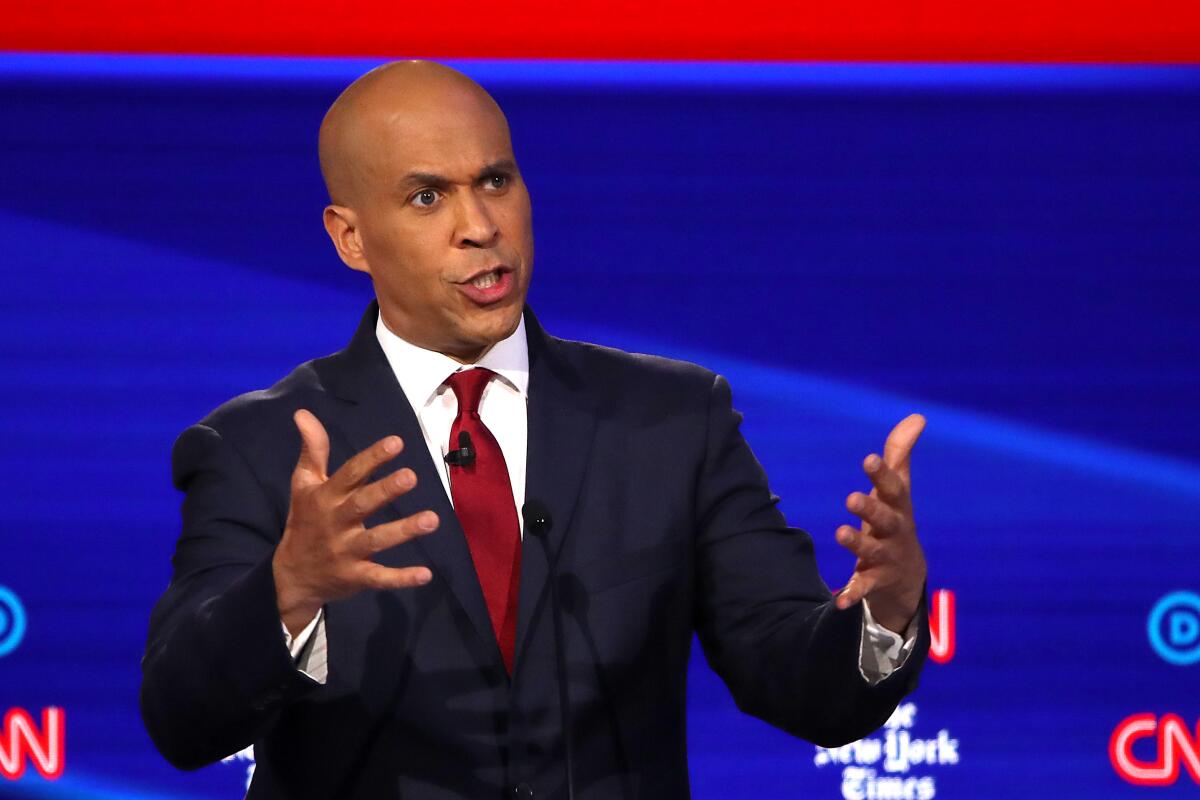
Cory Booker brought a blend of uplifting eloquence and experience organizing on the streets to a candidacy that drew comparisons to Barack Obama’s, but neither quality could carry him into the top tier of the Democrats’ presidential race. Short on cash and floundering in the polls, Booker ended his White House bid on Monday.
The exit from the race by yet another prominent black lawmaker leaves what was once a historically diverse Democratic field of presidential candidates increasingly white and old. The remaining minority candidates in the race, only one of whom is African American, all face single-digit polling numbers with little time to break out of the pack before voting begins early next month.
That reality has sparked discomfort and soul-searching among party activists at a time when racial justice is central to the Democratic agenda and inspiring minority voters crucial to their hopes of retaking the White House. Three out of four of the top-tier candidates dominating the race are now whites in their 70s. Yet they have drawn significant minority support, especially former Vice President Joe Biden.
- Share via
Think Iowa’s all white? Bernie Sanders hopes Latinos will tip caucus results

MUSCATINE, Iowa — Bernie Sanders sounded awkwardly gringo in naming the Latino politician he thanked for introducing him, and he bungled the Spanish title of his own event, dropping the “con” from “Unidos con Bernie.” Yet it only seemed to endear “Tio Bernie” to the Latino voters gathered in this Iowa town to see him.
In a state often criticized as too white to hold such political influence, Latinos are key to the coalition that Sanders is trying to assemble in his bid to win the Iowa caucuses that open the Democrats’ presidential-nominating contest on Feb. 3.
With Iowa very much up for grabs — no single Democrat has emerged as a dominant front-runner here — the state’s small but growing population of Latinos is getting unprecedented attention. Sanders is just one of the candidates investing heavily in appealing to the group, as Latinos become an increasingly influential and vocal presence throughout the state, organizing and winning local races in key communities.
For Democrats, it is an outsize effort to recruit in a demographic group that amounts to just over 6% of the state population — but is on track to be twice that within 30 years, according to the State Data Center of Iowa.
The number of Latinos has grown over the years as families decamped from Texas, California and other places to Iowa towns that promised work in meatpacking plants and other agricultural industries. Like elsewhere, their interest in politics is on the rise given President Trump’s hostile posture toward immigrants and the strain of crushing healthcare costs on blue-collar families.
“In the last election we didn’t show up, and we were punished for that,” said Angel Ruelas, a 22-year-old Sanders supporter whose parents had moved to Muscatine from Mexico. “People are reacting to everything that is going on,” he added. “They definitely are more willing to go out to caucus and go vote.”
- Share via
Can Amy Klobuchar pull off a surprise in Iowa’s presidential caucuses?
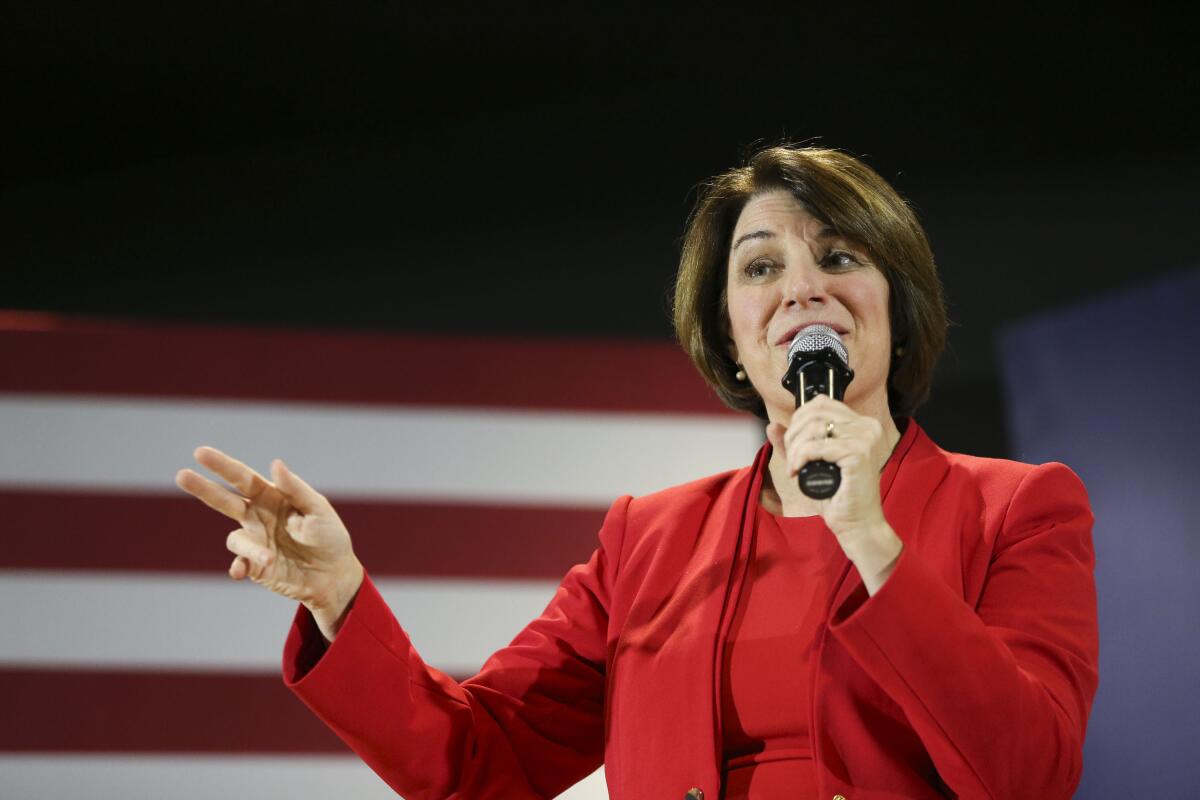
Amy Klobuchar, campaigning across Iowa in the first days of the new year, told voters about a text a friend sent her after a surge in polls and fundraising.
“It had autocorrected by mistake — it said congratulations on your insurgency,” she said to laughs from a few hundred people gathered at the Veterans Memorial Building in Cedar Rapids. “I’m happy to take those words! That’s fine by me, and I think that’s what you’re seeing all over this state and all over this country!”
Klobuchar’s optimism may be overstated — the Minnesota senator is in single digits in nearly every state and national poll, including an Iowa survey released Friday by the Des Moines Register and CNN, and she trailed her main rivals for the Democratic nomination by more than $10 million in the fundraising quarter that closed Dec. 31.
But Iowa political experts say her day job representing a neighboring state, her Midwestern values and the work she has put into meeting voters in big cities and small towns in every corner of the state could result in a surprise payoff when Iowans caucus on Feb. 3.
- Share via
What legacy does Pete Buttigieg leave in South Bend?

On Jan. 1, Pete Buttigieg’s second term ended, and the “Mayor Pete” era in South Bend, Ind., was over. In the Democratic presidential candidate’s telling, he presided over a Rust Belt comeback story in Indiana’s fourth-largest city, a metaphor for what is possible elsewhere in America.
That’s the resume that Buttigieg is promoting to make the jump from mayor to president. It’s a part of his appeal to Democrats who are anxious to win back Rust Belt voters who defected from the party in 2016.
But there’s a hitch. Among residents of color, who make up nearly half of South Bend’s population, reviews of Buttigieg’s legacy are noticeably mixed — some positive, some outright hostile.
- Share via
U.S.-Iran turmoil scrambles Democrats’ 2020 race, shifting focus to war and peace
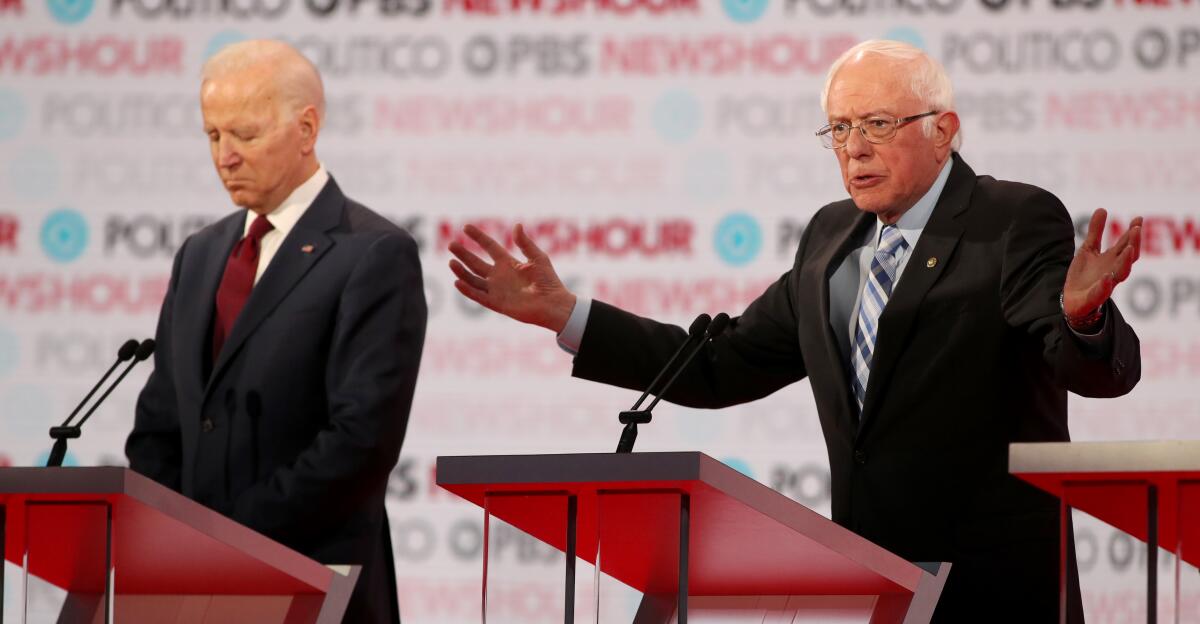
WASHINGTON — President Trump’s order for the targeted killing of a top Iranian general and Iran’s quick retaliation have scrambled the 2020 campaign, thrusting issues of war and peace to the center of a contest that so far has been dominated by domestic issues.
Iran’s launch of more than a dozen ballistic missiles against a U.S. military base in Iraq on Tuesday night guarantees that the political fallout from the killing of Gen. Qassem Suleimani will not fade anytime soon.
- Share via
Here are the key dates on the the 2020 presidential election calendar
Tonight’s Democratic presidential primary debate kicks off a 2020 presidential election calendar filled with events and key dates to remember.
We’ve created a curated calendar feed that you can subscribe to. The 2020 election calendar will contain key national events leading up to election day. We’re keeping close tabs on important dates and events in California, and will add important reminders for voters here. We’ll point you to stories to help you understand how these events impact campaigns and the election.
Here are key dates and events on the the 2020 presidential election calendar, including dates of debates, caucuses, primaries and conventions.

